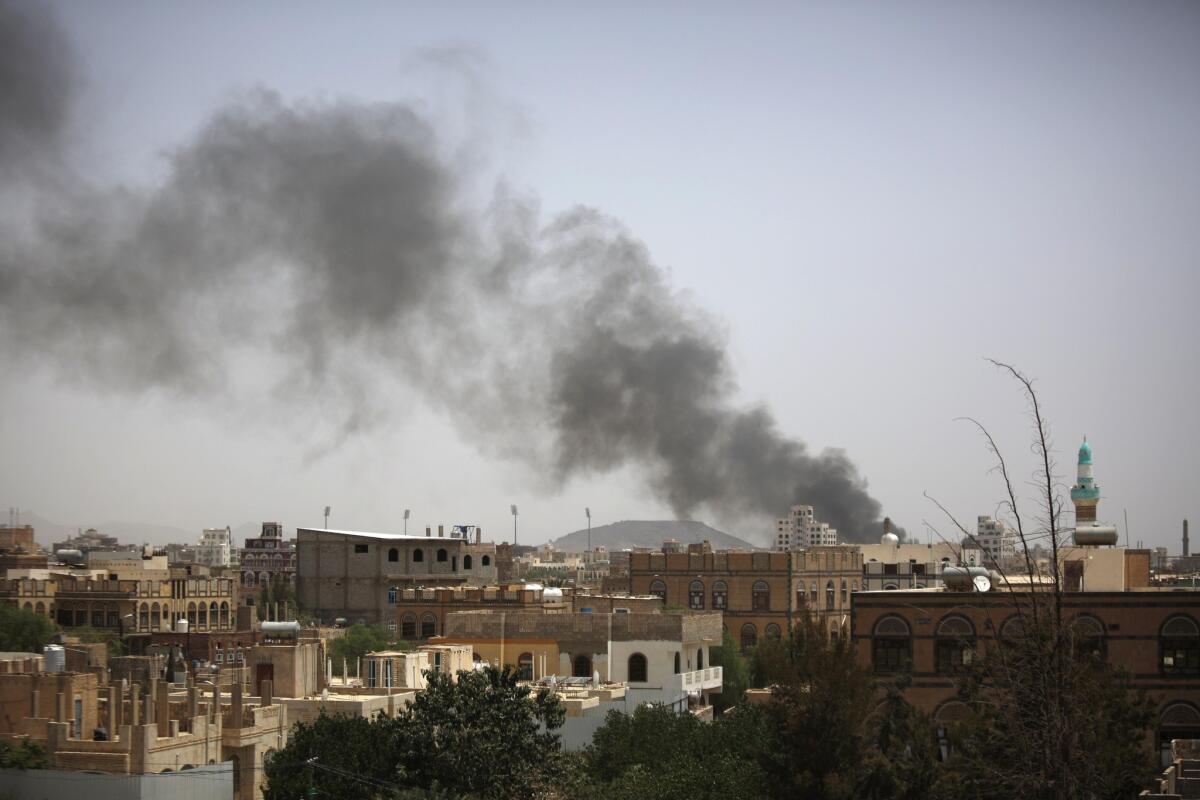Fighting and airstrikes persist in Yemen despite U.N.-brokered truce

Smoke rises after an airstrike in Yemen’s capital, Sana, on July 10. Loud explosions were heard in the city before a U.N.-brokered cease-fire took effect at midnight.
- Share via
Reporting from Sana, Yemen — Barely an hour after a United Nations-brokered cease-fire took effect in Yemen on Saturday, fighting erupted between the warring sides and Shiite Muslim rebels accused a Saudi Arabian-led coalition of carrying out airstrikes against them.
It was an inauspicious start to the “humanitarian pause” that is supposed to last until the end of the Muslim holy month of Ramadan in about a week so aid workers can deliver critical supplies to civilians caught in fighting that has killed more than 3,200 people.
Yemen was already the Arab world’s poorest country when the U.S.-backed regional coalition launched an air campaign in March to restore exiled President Abdu Rabu Mansour Hadi to power and imposed an air and sea blockade to prevent weapons from reaching the rebels known as Houthis.
The country, which imports most of its commodities, is now dangerously short of food, fuel, medicine and other goods. U.N. officials have warned that Yemen is on the brink of famine with more than 21 million people -- 80% of the population -- in need of immediate aid or protection.
Convoys of humanitarian supplies were reported to be lined up outside the southern port city Aden, where a day of heavy shelling and airstrikes Friday came to a halt shortly before the truce took effect at midnight.
But two hours later, Al Masirah TV, a mouthpiece of the insurgent Houthis, was reporting that coalition aircraft were already targeting rebel positions in the city and in the capital, Sana. More bombs hit in the province of Hajjah, which borders Saudi Arabia, and the crossroads province of Taizz, north of Aden, the station said.
Residents also reported fierce clashes between pro-Houthi forces and rivals loyal to Hadi in Aden, Taizz, Hajjah and other flashpoint areas.
Anti-aircraft guns thundered through the night in Sana, which is controlled by the Houthis and members of the national security forces still loyal to Yemen’s deposed strongman Ali Abdullah Saleh.
Weary residents joked on social media that the country had set a new record for breaching a truce: 58 minutes.
“I’m not very optimistic about truces any more,” said Tawfiq Sheikh, 53, who was shopping for cucumbers, tomatoes and carrots at a market in Sana. “Last time there was a truce, we heard strikes everywhere.”
His said he had gotten used to the sound of explosions. His main concern was for his four children, who can’t go to school and wake up frightened at night because of the airstrikes. “Sometimes the children sleep with their hands on their ears,” he said.
U.N. officials had high hopes for the truce when they announced the deal Thursday. But others were skeptical. When the warring sides agreed to lay down their arms for five days in May, the effect was primarily felt in Sana. Clashes continued in other areas that have born the brunt of the fighting.
“A pause that’s not ... framed as a stepping stone toward a wider agreement on ending the war and does not have buy-in from local factions will inevitably fail -- especially when the warring sides on the ground are dug in within a few hundred meters of each other,” said Hisham Omeisy, a political analyst based in Sana.
In a televised speech Friday, the Houthis’ leader, Abdel-Malek Houthi, said he didn’t think the cease-fire would last.
“We had a bad experience during the last one, and its success is connected to the commitment of the Saudi forces to stop attacks completely and end the siege” on air and sea ports, he said.
Coalition leaders said they had not received a request from Yemen’s exiled government in the Saudi capital, Riyadh, to take part in the truce, Al Arabia TV reported. The bloc was “not concerned with this truce because it does not provide a commitment from the Houthi militia,” the Saudi-owned station quoted Brig. Gen. Ahmed Asiri, an advisor to the Saudi Defense Ministry, as saying.
Saudi Arabia, which is dominated by Sunni Muslims, considers the rebels a proxy for Shiite-led Iran. The Tehran government denies arming the insurgents, but has stridently opposed the Sunni coalition’s campaign in Yemen.
U.N. Secretary-General Ban Ki-moon had received assurances from Hadi that he would communicate his support for the cease-fire to the coalition, according to a statement issued by Ban’s office Thursday.
The U.N. Security Council urged all parties “to exercise restraint in cases of isolated violations and to avoid escalation.”
“No party should take advantage of the pause to move weapons or seize territory,” it said.
Even if calm could be restored for a few days, humanitarian workers cautioned that it would be impossible to reach all those in need.
“We’re never going to reach 21 million people with food and water,” said Tariq Riebl, head of programs for the aid group Oxfam in Yemen. “The only solution is the resumption of commercial activity.”
Sunni extremists affiliated with Al Qaeda have capitalized on the chaotic violence to make territorial gains.
On Friday night, residents said a vehicle carrying four members of the Al Qaeda-allied group Ansar al Sharia was hit in a suspected U.S. drone strike in Mukalla, capital of Yemen’s largest province, Hadramawt.
There were conflicting accounts of the number of militants injured and killed. Officials in Washington did not immediately comment on the strike.
Special correspondent Al-Alayaa reported from Sana and Times staff writer Zavis from Los Angeles.
For more international news, follow @alexzavis on Twitter
More to Read
Sign up for Essential California
The most important California stories and recommendations in your inbox every morning.
You may occasionally receive promotional content from the Los Angeles Times.










